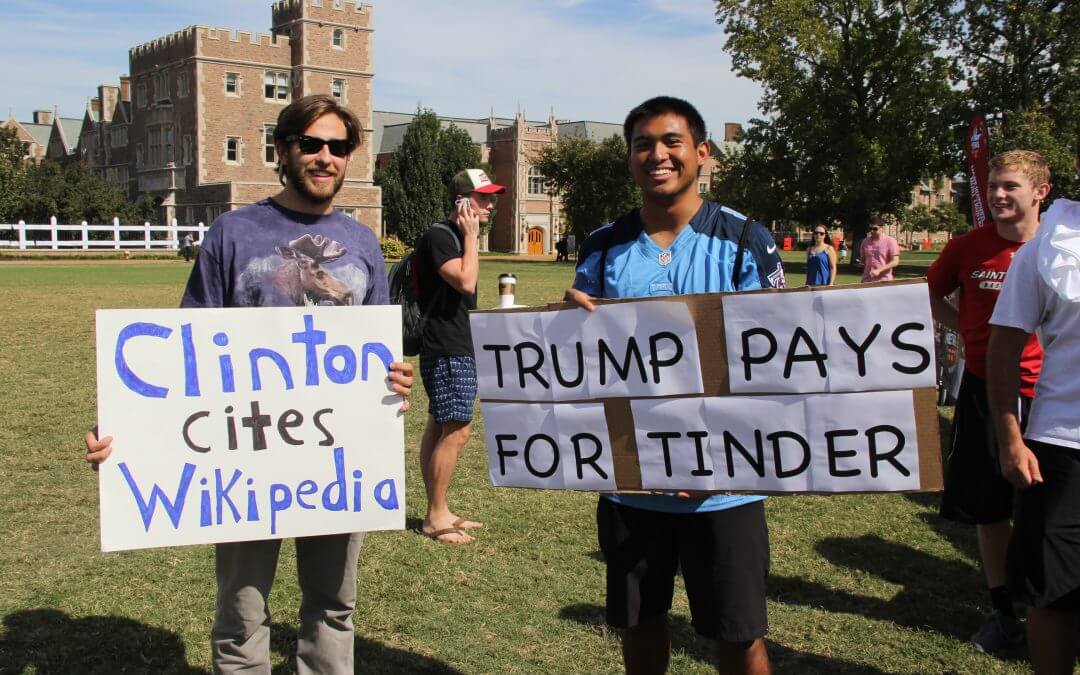ST. LOUIS – For U.S,. college students getting their first taste of presidential politics, the Clinton-Trump election is baffling. “As a Republican, there is nothing I wanted more than to vote for the Republican nominee,” said Zach Persing of Livingston, New Jersey.
“Seventeen Republicans ran for president [in the primaries.] Did I like them all? No, not really. But I would have voted for 16 of them,” he stated. “Donald Trump just crossed that line.”
Persing is a sophomore at Washington University in St. Louis, the site of the second presidential debate. Last week, the school’s College Republicans decided not to endorse Trump, and instead wait until 2020 to support a Republican candidate.
Persing is the group’s policy coordinator. He thinks Clinton and Trump are the least desirable pairing of candidates in the history of the country. “The reason that Donald Trump remains somewhat competitive is that he is running against someone that is so unpopular,” he said.
Many millennial voters on campus were hoping the debate would shed light on the issues that matter to them. Washington University junior Andrew Eichen hoped to hear the candidates discuss the war on drugs and how “hundreds of people will be jailed today for the war on drugs, and nothing is going to be done about it.”
Eichen said young voters like him are dissatisfied with the lack of substantial economic policy discussion in the debates and are tired of the mud-slinging. He wants to hear more about interventionist foreign policy, voting reform and term limits.
“It’s clear that the two-party system is dying,” Eichen of Bernardsville, New Jersey, said. “People really hate the two parties. And it’s that the two parties aren’t speaking to the issues that really matter to us. Whether you’re a Libertarian like me or extra left and a green-friendly guy.”
Eichen protested outside the debate site on Sunday, holding a large sign showing Libertarian candidate Gary Johnson’s face with the hashtag, “#LetGaryDebate.”
Millennial Americans — those between 18 and 35 — make up 31 percent of the electorate. Their voting power is nearly equal to the voting power of the boomer generation in this election, that is, if they vote. In the 2012 election, the Pew Research Center found that just 46 percent of eligible millennials voted, compared to 69 percent of eligible boomers.
Washington University senior and College Democrats president Jimmy Loomis thinks millennials could ultimately make the difference on election day. “It’s an opportunity for millennials to demonstrate to the parties and candidates what issues are important to them and use that leverage to really move the candidates.”
But even after Sunday night’s debate, it’s not at all clear where millennials are headed.
Zach Persing said College Republicans decided against endorsing Trump because of policy disagreements and a lack of faith in the New York billionaire’s character. Still, Persing agrees with the frustrations of Trump supporters — a government that isn’t catering to the people, a gridlocked Congress and the continued threat posed by ISIS — but by electing Trump, he said, it would “only further those frustrations and concerns.”
Washington University senior Iman Abdikarim of Oak Hill, Virginia, said she never thought the Republican party would be in this position, where the party would nominate a “racist and prejudiced” candidate. “It’s really unfortunate that it took someone like this for the Republican party to realize the direction they’re going is not the correct one.”
“Inherently, conservative values are just a different view of how government should be run and not run. It’s just not the opinion I hold,” Abdikarim said. “But when you add systems of bias and oppression and prejudice, that’s what needs to be addressed. If the Republican Party can address those issues and represent conservative values in a positive way, then they should be fine.”
Sophomore Chris Detloff of Riverside, Illinois, thinks voting third-party is an increasingly enticing option for millennials. “We have two pretty bad candidates right now and young people want fiscal conservatism and socially liberal policies,” Detloff said. “That resonates with a lot of young people. Bernie [Sanders] garnered some of that support, but I think Gary Johnson could really take most of that on.”
Many of the students were disappointed with the second presidential debate. They said it was a continuation of the bitter and content-light first presidential debate, with Trump going after Bill Clinton’s marital infidelities and Clinton attacking Trump’s judgment. Serious arguments over policy, most notably over how to deal with ISIS and the crisis in Syria were deflected, while many purported facts went unchallenged.
Persing, of the College Republicans, said his group had no problem discussing in civil ways the differences between their favorites in the Republican primary field of 17 candidates. “I don’t think it caused a rift in the club,” Persing said. “The person that caused a rift in the club is Donald Trump.”


